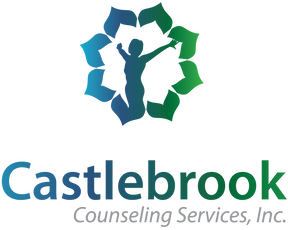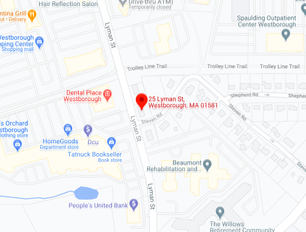Clinician Spotlight: An Interview with Julie Massi, LMHCLauren Chapin, LICSW
Welcome to Clinician Spotlight, a series where I sit down with some of our wonderful therapists for a cozy conversation about work, mental health, and many life tidbits in between. This month, I had the opportunity to get to know Castlebrook’s newest addition to the team, Julie Massi. She and I chatted over Zoom where she discussed her journey to Castlebrook, why she values the mental health profession, and how the recorder is not just the squeaky instrument you played in elementary school. ******** Lauren: Hi! Thanks for taking the time to sit down with me. It’s a pleasure to have you on board! Why did you originally get into the mental health field? Julie: This is actually a career change for me! I worked for a number of years in financial services jobs with some great people. I started to explore volunteer work in my off hours and one of those positions was as overnight staff at a women’s shelter. I noticed that I really looked forward to the part of my night when the guests would come home to talk about their days, goals, and plans. I enjoyed listening, having a conversation, and being supportive and encouraging. So I started thinking, “What if I had a job where this is what I could be doing all day? That sounds really great, I think I’d like to do that.” That’s what led me to consider getting into counseling professionally. Lauren: That’s a wonderful story. What ultimately brought you to Castlebrook? Julie: I always saw myself in a group practice setting because collaboration and teamwork are really important to me. I never wanted to be an island, so to speak. I appreciated how open and transparent Kerrie [the director] was throughout the hiring process and also appreciated the focus on making sure that clinicians are operating at our best so that we can do what’s best for our clients. Lauren: Absolutely. Do you see any crossover, or skill sharing, between the corporate world and counseling? Julie: Yes! Analytical skills definitely apply as well as communication skills. Taking in and processing lots of information to put together the story of where we are and where we want to go, understanding and factoring in the other person’s perspective when we need to work together, and having to face challenging results at times. That’s been helpful to take into therapy as I want both the client and myself to feel like it’s going in a good direction and that their needs are being met. Lauren: I can see the similarities for sure. Where did you end up doing an internship after graduate school? Julie: I did my internship in residential programs at a local community mental health agency. The setting was different from outpatient, but the work can be very similar. I had a lot of encouragement, freedom, and support to approach the meetings like counseling in their homes, and I often found us reinforcing skills that clients were working on and picking up threads that they might not have gotten to during their in-office therapy sessions. I enjoyed it so much. I returned there after graduation to get some experience in their crisis stabilization service for people transitioning out of hospitalization. I got to understand how hard it is to ask for help or to trust that the person sitting there asking you all these questions is there to help. Particularly in situations where you don’t know how this information might be used or what will happen next. It taught me to be transparent and open about why I’m doing what I’m doing–I want people to be informed about the process. Lauren: That’s a tough balance to strike between assessing risk and maintaining trust and transparency. Julie: Definitely. I always focused my questions on understanding where the person is at, what they are going through, and making sure that I`m not overreacting or underreacting to what I'm seeing and hearing. I also learned to focus on creating a comfortable environment and showing up as my genuine self, to try to set people at ease and let them know that I’m there for the right reasons. Lauren: Does that translate into your style of how you approach therapy? Julie: I definitely gravitate towards the modalities of therapy that are person-centered. I want to make sure as much as possible that the person's needs, preferences, and rights are being respected. Part of that means that people might make decisions that I would not have made for them, but sometimes people need to try something out and see how it goes, and if it doesn't go the way that they hoped, that’s the opportunity to try something different. There is a bit of risk and uncertainty associated with that, but it’s important for therapy to be a place where clients have a sense of agency. Lauren: That makes sense. What might you tell somebody who is nervous about beginning therapy? Julie: It might sound cliche, but it does take courage to take those first steps toward getting support, and I don’t think that's something that should be taken for granted. There is a whole process that could have happened before a person is sitting in front of me. Opening up comes at your own pace. The therapist has a responsibility to prove to you that they’re going to be helpful, and if it feels like it’s taking a while for that to become clear, it’s so helpful to bring that up with the therapist to talk through together, even if that seems easier said than done. Lauren: What’s your favorite thing about being a therapist? Julie: There are a bunch of things. Just the fact that people let me into their lives in this way is pretty amazing and meaningful to me. I really like getting to know so many different people, getting to see their strengths, and how they’ve already brought themselves through some really challenging, difficult situations. I love moments when a skill I suggest works out really well and I get to hear about it in the next session, or when a client lets me know that I have really understood where they are coming from on a deeper level. Lauren: So part of therapy and the mental health field is taking care of yourself. What do you do outside of work to recharge? Julie: One thing that I’m really glad I got to return to doing post-lockdown is my early music group. We play recorders, not the squeaky plastic ones from elementary school, but real wooden ones [laughs]. We perform music mostly from the Renaissance or early classical periods at museum events, holiday festivals, and things like that. Lauren: How cool! What’s one last thing you’d like to leave us with? Julie: A quote that I like, I can’t remember who said it, is that we grow in spirals. I think of it like stretching out a slinky. if you look at it from the side you can see the spiral traveling up, but if you look at it from the top, you just see a circle. A lot of times in life we’re going through situations that we feel like we’ve been through before and we can’t believe that, “Here I am, at the same point of the circle, just going around and around.” But if we’re growing, we’re actually moving up the spiral of the slinky. Even if you’re coming across a situation that feels familiar, if you have skills and insights you didn’t have before, it’s not the same situation. It’s a time to put all of that knowledge to use for a better outcome. |
Archives
May 2025
Categories |
Mission Statement
Castlebrook Counseling Services, Inc. is a group of private practice clinicians with a shared goal of strengthening our community by providing therapy and clinical support designed for children, adults, and families to successfully meet life’s challenges.
 RSS Feed
RSS Feed

